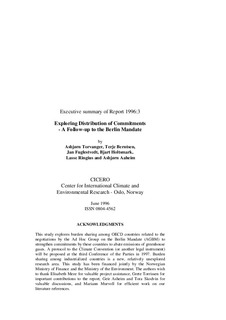Exploring distribution of commitments: A follow-up to the Berlin Mandate
Torvanger, Asbjørn; Berntsen, Terje Koren; Fuglestvedt, Jan S.; Holtsmark, Bjart; Ringius, Lasse; Aaheim, H. Asbjørn
Research report
Permanent lenke
http://hdl.handle.net/11250/192114Utgivelsesdato
1996Metadata
Vis full innførselSamlinger
- CICERO Reports [210]
Sammendrag
The study reviews and analyzes some major issues that must be considered when defining principles for distributing commitments to reduce greenhouse gas emissions for countries belonging to the Organization for Economic Cooperation and Development (OECD).
The study is divided into three main parts, where the first discusses the concept and measurement of costs, the second analyzes the negotiations and burden sharing rules, and the third analyzes the handling of a mix of greenhouse gases.
The study shows that removal of subsidies on fossil fuels or minimum fossil-fuel taxes have advantages in terms of cost-effectiveness and fairness compared to quantified national reduction commitments. The calculations suggest that a moderate climate policy is optimal, but a more ambitious climate policy is favorable if emissions abatement is relatively inexpensive or climate-change effects are uncertain. The burden sharing rules examined have quite different consequences for the OECD countries depending on the choice of rule and weights of the criteria included. Due to the lack of reliable methodologies and uncertainties in the understanding of the mechanisms of some gases, not all climate gases should be included in the negotiations.
